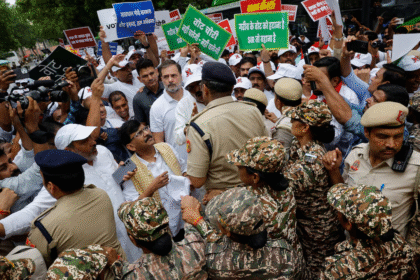Adampur Airbase: PM Modi Asserts India’s Firm Stance Against Terrorism Post Operation Sindoor
India’s new Lakshman Rekha (red line) against terrorism is crystal clear and New Delhi will respond to any future attack fiercely, Prime Minister Narendra Modi said on Tuesday during a surprise visit to the frontline Adampur airbase in Punjab that doubled up as a show of strength.
With the Russian-origin S-400 missile launcher in the background, Modi hailed the achievements of the armed forces in the recent four-day conflict with Pakistan, praised “jointness” in the armed response, and said terror bosses in the neighbouring country were now aware that any attack on India will result in their destruction.
“India’s Lakshman Rekha against terrorism is now crystal clear. India will respond strongly if hit by a terror attack and our response will be at a time of our choosing, on our conditions and in our way,” he said in the context of Operation Sindoor during his nearly 30-minute address.
“I have come here today for a darshan of our brave soldiers…you have scripted history and will be an inspiration for this generation and the future.”
Modi’s visit to the Adampur airbase appeared designed to puncture Pakistan’s extensive disinformation campaign about striking several Indian military installations, including air bases, during the May 7-10 conflict, officials said.
Adampur, one of the premier bases of the Indian Air Force that is located 25km from Jalandhar town, is among those that Pakistan falsely claimed to have attacked, destroying the Russian-origin S-400 air defence systems deployed there, hitting the runway and fighter jets, and striking a radar site too.
Images from the airbase, home to the IAF’s MiG-29 fighters, included a photo of the PM in front of an S-400 launcher as he addressed the air force personnel; the first public image of the long-range air defence system in IAF service. Another photo of Modi interacting with the men and women at the base showed a MiG-29 fighter jet with a fully intact runway in the background.
His remarks came three days after India and Pakistan reached an understanding on halting military actions, drawing the curtain on four days of escalating conflict involving drones, missiles and long-range weapons that raised fears of a full-blown war.
Modi landed at Adampur airport in a C-130J special operations aircraft at 6.15am and stayed at the airbase for nearly 50 minutes, during which time he interacted with air force personnel and senior officers of the armed forces. Jalandhar deputy commissioner Himanshu Aggarwal said Modi’s visit was “highly confidential”.
In his speech, Modi hailed the armed forces that carried out Operation Sindoor, when India struck nine terror bases in Pakistan and Pakistan Occupied Kashmir on May 7, and said the operation was the confluence of New Delhi’s policy, intention and decisiveness.
“Nine terror bases were demolished. More than 100 terrorists died. The terror bosses now understand that if they even look at India, they’ll invite destruction. You told the Pakistani army, whom the terrorists depend on, that there is no place in Pakistan where they can be safe,” Modi said.
The remarks were a response to the April 22 terror attack at Pahalgam in Kashmir, where gunmen shot dead 26 people – all men, 25 of them tourists and 24 Hindu – in what was the worst attack on civilians in the country in roughly two decades.
Modi reiterated the three aspects of the new India’s doctrine – every terror attack against the country will draw a strong response, New Delhi will not tolerate nuclear blackmail, and India will not make a distinction between governments patronising terror and terrorists. He made those points on Monday too during his address to the nation
He said Operation Sindoor increased India’s confidence and boosted its unity, accused Pakistan of using civilian aircraft as shield for its attacks, and hailed the air force for not harming any civilian flights. “Not only did Pakistan’s terror bases and air bases get targeted, but also their terror misadventures and bad intentions got demolished,” he said.
He said the world now coming to grips with India’s new muscular and hailed the coordination among the armed forces. “This is jointness. This is now the strong identity of the Indian military’s capabilities,” he said.
“We must be ready. We must keep reminding the enemy that this is a new India. We want peace but if there is an attack, then this India can demolish you,” he said.
He said India’s air defence systems, including the indigenous Akash surface-to-air missile system and the S-400 platform, provide a strong shield against the enemy’s firepower.
“Pakistan cannot match our capabilitiesity built on cutting-edge technology,” he said, adding that the Indian armed forces were provided the best technologies of the world in the past decade. “When our armed forces take the wind out of nuclear blackmail, our enemies understand the importance of ‘Bharat Mata Ki Jai’,” he said.
The armed forces agree.
“Putting together and operationalisation of this potent air defence (AD) environment has been possible over the last decade due to unwavering budgetary and policy support provided by government in acquiring state-of-the art equipment and weapon systems,” said Air Marshal AK Bharti, director general air operations, on Monday.
Apart from striking Adampur, Pakistan’s other false claims included assertions about damaging airfields at Suratgarh, Sirsa, Srinagar, Jammu, Pathankot, Bhuj and Naliya, neutralising a BrahMos missile base at Nagrota, and hitting an ammunition dump in Chandigarh.
The Indian military ’s resilient, multi-tiered air defence (AD) network — a mix of legacy and modernity, and of indigenous and imported weapons — thwarted multiple waves of Pakistani attacks on scores of locations from May 7-10, and minimised damage to military infrastructure and civilian areas, top officials said on Monday at a special briefing on Operation Sindoor.
India’s military bases and systems are fully operational, and ready to undertake any mission.
Foreign secretary Vikram Misri earlier debunked Pakistan’s claims about destroying military installations, critical infrastructure, and power and cyber systems. These weren’t merely propaganda efforts but strategic attempts to shape military and diplomatic responses.
Operation Sindoor began in the early hours of May 7 with India achieving its intended target.
Between the strike on the terror camps and the announcement of the ceasefire on May 10, the IAF struck multiple military targets in Rafiqui, Murid, Chaklala, Rahim Yar Khan, Sukkur, Chunian, Pasrur, Sialkot, Skardu, Sargodha, Jacobabad, Bholari and Malir Cantt in Karachi.
Also Read: PM Modi Chairs High-Level Meeting on National Security Amid Rising India-Pakistan Tensions








